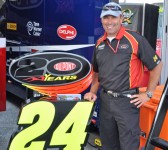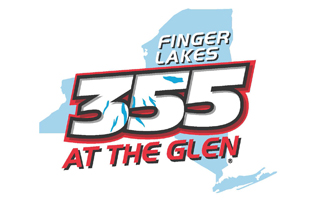[media-credit name=”Photo Credit: Gary Buchanan” align=”alignright” width=”168″] [/media-credit]How did you become a spotter?
[/media-credit]How did you become a spotter?
“Well, I used to drive late models and modified’s in the NASCAR touring division. I first drove to Charlotte in 1996. I became a General Manager since I have a good business background and we needed a spotter one day for the Cup race with Bill Elliott when I was a general manager there so I just started doing it and I’ve been doing it ever since 12-13 years ago.”
Entering adulthood, was your plan originally to work in auto racing or did you have another plan for your future?
“Everything just kind of fell into place. I went to high school and college at C.W. Post on a Baseball and academic scholarship and I went there and started commercial window business in Manhattan where we made and sold commercial window systems and I just raced in the area. I did that for about 15-16 years. But, I raced all over the East Coast while I did that. A bunch of us moved down to Charlotte in 1996, Tommy Baldwin, myself, and Steve Park, and it just kind of all evolved.”
How did you manage your time between your business and your racing?
“We had very little sleep. I had to wake up at four o’clock every day to travel to my job and then come home and be with my family for a little while and then go to the shop and work on my race cars and go to be at 12:30-one o’clock every night.”
What has been the biggest challenge that you’ve faced in your career?
“I think the change in it all. After about four years I went to work for Bill Elliott as his General Manager. I wanted to work with him for the rest of my life. His career was winding down and Ray Evernham came up to me and asked me if I can convince Bill to drive for him as he was going to start up a Dodge team and he wanted me to come and be his General Manager. Eventually he bought out Bill Elliott Racing. After that I became the GM at Evernham Motorsports. But, the biggest challenge has been changing jobs because the platform of the sport changes. I worked with Robert Yates for almost four years and became like a second son to him and the challenge itself has been to pick up teams from the ground and the business changes in one way or another. The change of it is a little bit devastating but you have to try to make the best of it in the long term.”
Can you elaborate on your relationship with Robert Yates, Tommy Baldwin, and Ray Evernham?
“Tommy and I have been best friends for 37 years, our friendship goes back when he was seven years old and I stuffed him in a tire and rolled him down a hill in the mud and we became best friend’s ever since. His dad and I were extremely close. As far as Ray goes, I knew him from back home and when I came down here and I was always happy for him and his accomplishments. Then I started working for him for a while. Robert and getting to know him and getting to run his company and turning it around was a pretty big change from when I got there. I can say that I became a second son to him and after three and a half years his career wound down and sold the team. I spent so much time with these people, it’s pretty easy to build a relationship with them. You spend more time with the people you work with than your own family.”
What years did you work with RYR and what did you do to turn around the team?
“I started in the last two races in 2003 and I left mid-season 2006. When I left, there was trouble financially. When I got there, they had two top ten’s between Dale Jarrett and Elliott Sadler and then the next year they had two wins, 23 tops ten’s and when I took over it totally changed a lot of the ways things were going on. They just needed someone to come in and give a fresh look at it. We won Talladega in 2005 and it was also the last time Dale Jarrett won a race. It was pretty good for a couple of years and they ran well.”
How do you take that experience you have with managing teams and taking it to the teams when your spotting?
“There aren’t that many parts of the managerial side that play a role while spotting, it’s more of my time as a driver. I make it seem like the driver’s I’m working with are in my shoes.”
Previously, you worked with Kyle Busch, this season you’re working with Jeff Gordon and Justin Allgair. What differences do you see between the two drivers compared to other drivers you worked with in the past?
“Jeff is a Cup Series professional and he’s extremely professional in his approach as he never ever gets angry, he doesn’t call out anyone on our team and when something goes wrong he’s the positive guy that takes care of everything and he’s extremely talented. Kyle is also talented, but he’s more exaggerated in his feelings and emotions. All of the stuff that is happening to him is happening for the first time when Jeff has been through all of it, winning four championships and having a lot of experience. With Kyle, he has all of the talent in the world to win multiple championships, but they are totally different personalities. They’re both very good but on two parts of the spectrum.”
What are the differences which you have witnessed going from Joe Gibbs Racing to Hendrick Motorsports?
“I think that they’re very similar in how they approach things on the performance side. My son works at JGR and I’m very happy for him. At HMS, it’s very polished, they have more years than JGR, JGR started up after HMS so you can see that the experience things that HMS has with the championships between Jimmie Johnson and Jeff in house as opposed to just three with JGR with Tony Stewart and Bobby Labonte. It’s just the maturity of the organization. Gibbs will get to winning championships in years to come, but I think Hendrick stand on its own platform.”
What does your OLDEST son do with JGR?
“He is a mechanic for the No. 18 Nationwide team.”
Besides being a spotter, what additional roles do you have with the team?
“None, that is all I do with the No. 24 team. I also spot for Miguel Paludo and Justin Allgair. I do contract work for drivers and teams, but that’s all I do.”
When not spotting or writing up contracts, what do you usually do?
“Well I have two dogs that I look after and take care of in my house. I’ve been doing a lot of laundry these days because we’re in mid-season form and get home at four o’clock in the morning on Saturday night.”
Does the speed of the sport, going week-to-week ever get to you?
“Yeah it does, but, after all these years, I’ve gotten a pretty good basis of it without overwhelming me. I can see that happening to some young kids that drive. But, I started all of this in 1981 and have been through it for a quite amount of years. The schedule isn’t foreign to me. It used to be a lot harder with all of the testing where we spent the weekend at the racetrack and then go to another track for three days to test.”
How much longer do you plan on spotting?
“I don’t really know. I don’t really have a plan. I’ll probably keep going as long as I can do it. I enjoy working for the best company in the business and the best driver in the business. But, I don’t really have a plan.”
Once you do retire, what will you do with all the free time every weekend?
“I don’t know (chuckles). That’s a good question, but I’m not sure yet. Maybe I’ll consult for people. It’s just in my blood and it’s really hard to walk away from it.”
With your managerial background, what is the possibility of you owning a team in the future?
“I owned two Nationwide teams with Tommy Baldwin and myself and then I had my own Nationwide team and ARCA team with Randy Humphrey. I might get back to it one day, but it would be when the economy turns around a little bit better and when I can get people to be behind me to keep it financially stable. There was a couple of times around when Tommy and I built teams that were very strong, but we couldn’t find the funding.”
The Nationwide team you owned a few years ago in 2008 or 2009 right?
“That sounds roughly correct. The last Nationwide team I owned, Kyle drove for us at Watkins Glen and finished second. But I also owned the start and park teams with Randy Humphrey a few years ago. We were trying to build a full-time Nationwide team but we could never get the money to do it. But, the Nationwide team that Tommy and I had was sponsored by Unilever and is still around today.”






